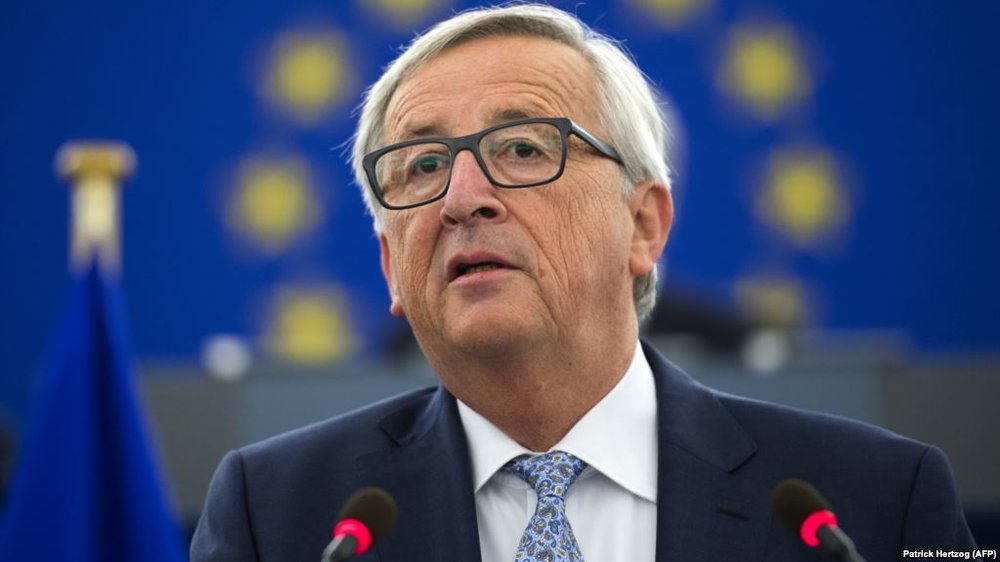New American - European conflict

TEHRAN - The European Union seems to be confused about what's happening in the international system. This confusion has intensified in recent days, after the departure of the United States, of a nuclear deal with Iran. The US-EU conflict over tariffs (steel and aluminum) has also shown that Europe needs to prepare itself for an economic war with Washington.
European officials continue to worry about their political future. The social, political, economic and security developments in Europe show that the European Union is not in a good position. This has caused European officials and many experts and analysts to warn Europe's issues about the future. A future whose signs are now visible.
As New York Times reported, Venting anger at President Trump, European leaders said Thursday they would take steps aimed at blunting the effects of the American sanctions he restored on Iran, which could penalize European companies doing business there. At a European Union summit meeting in Sofia, Jean-Claude Juncker, the president of the European Commission, the bloc’s executive arm, said it would begin a legal process to prohibit companies based in the 28-member union from complying with the American sanctions.
“We should know that the effects of the announced American sanctions will not remain without consequences,” Mr. Juncker said. “We have a duty to protect our European companies.”
The meeting, with leaders of western Balkan countries, came barely a week after Mr. Trump quit the 2015 nuclear agreement between Iran and leading world powers, which has eased sanctions in exchange for verifiable curbs on Iran’s nuclear activities. Leaders of Britain, France and Germany had implored Mr. Trump in vain to honor the accord, which he has long described as a disastrous giveaway.
The other parties to the agreement, including Iran, China and Russia, have said they want the agreement to survive. At the same time, Iran has hinted that it may no longer honor the agreement if the promised economic benefits do not begin flowing to the nation of 80 million.
The withdrawal of the United States is a potentially fatal blow to the agreement because it restores all of the American sanctions, which not only restrict commerce with Iranian energy, banking and other sectors, but could penalize foreign businesses that trade with or invest in Iran.
In any case, the European Union is not in a good position. The recent victories of right wing extremists in Austria, Germany and…, isn't merely the result of the nationalist movement success in introducing its principles and manifestos. But it is also a result of the failure of the "European moderation" policy to resolve social, security and economic problems in the EU and the European Union. In such a situation, European citizens find that the solutions offered by the moderate left parties didn't work in removing the existing crises in Europe. Obviously, in this situation "crossing the traditional parties" would become a general demand in the West. Under such circumstances, Merkel's and other European leaders' warnings about the return to the twentieth century and the time before the formation of the United Europe simply means the inability of the EU authorities in preventing the Right-extremism in the West.
France and Germany are two countries that are afraid of the future of the European Union and, on the other hand, have unwittingly led to the fall of the European Union with their behaviors. An overview of the French President's remarks at the Davos summit can be analyzed and analyzed. Speaking at the Davos summit, "Emanuel Macron" the French President warned of the victory of nationalists and extremists in Europe and said:
"In my country, if I do not make sense of this globalisation then in five, 10, 15 years time it will be the nationalists, the extremes which win -- and this will be true of every country."
The commonality of Merkel's and Macron's remarks is their concern about the return of European citizens to nationalism. As noted, this process has intensified in Europe. The extremist party of Freedom found way to the Austrian coalition government, and the increase in radical far-right votes in countries like France, Sweden and Germany, is a serious crisis in Europe. The recent warnings by the German Chancellor and the French President should therefore be seriously analyzed and evaluated.
Ultimately, the US-EU conflict has reached its peak. Meanwhile, Europe can only resist Washington if it forgets to "deal with the White House." Will Europe succeed in this direction?
Leave a Comment